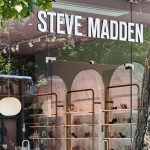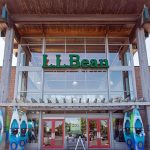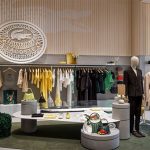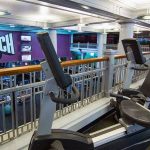Back in 1960, Robert Tucker opened a 2,500-square-foot shoe store in downtown Kannapolis.
Today, he reigns over a 644,000-square-foot headquarters in Concord, overseeing a shoe retailing chain with more than 860 stores.
Shoe Show Inc. is one of the largest privately held shoe retailers in the United States.
Tucker, 65, has intentionally kept quiet about his burgeoning company, which employs more than 6,500 people in 32 states. “We keep our heads down,” he says with a grin in his soft-spoken Cabarrus County drawl. “They dont get shot off that way.”
Shoe Show, with annual sales climbing toward $750 million, also owns stores carrying the Shoe Dept. and Burlington Shoes names. It’s among a dwindling breed of large privately held shoe retailers.
Just a handful of such companies remain, said Peter Mangione, president of trade group Footwear Distributors and Retailers of America.
Among them are Boston-based New Balance, which had 2001 sales of more than $1.1 billion and Charlotte-based Rack Room Shoes, founded in Salisbury and owned by a European parent company, Deichmann Group, since 1984.
Rack Room, which doesnt disclose sales, has about 350 stores in 24 states and another 33 stores in its Off Broadway Shoe Warehouse subsidiary. The company’s CEO, Bob Hartley, said he admires Tucker’s track record at Shoe Show.
“Youve got to respect what he’s been able to accomplish. He is a legend in this industry — to be able to start from scratch and build a company the way he has is very impressive,” Hartley said.
Shoe Show’s growth — it’s been roughly doubling every five years — is dramatic considering the overall shoe market has been relatively flat in the United States over the last decade, Mangione said. For the last three years, the company has opened new stores at the rate of one every five days.
Two factors have hurt shoe sales over the last 10 years, Mangione said: A trend toward more casual dress at work, which reduces the number of expensive dress shoes people need to buy; and the trend among women to gravitate toward black shoes rather than colorful ones, meaning they dont need a wide variety.
Over the last decade or so, shoe sales have grown at only about the same rate as the U.S. population, about 1.5 percent a year, Mangione said. Last year, though, the sputtering economy took its toll, and shoe sales declined 5 percent from 2001 to $40.5 billion, said market tracking group NPD.
But another trend has aided Shoe Show: bankruptcies and closures of many large shoe companies including Kinney and Thom McCann.
“(Those closings) created opportunities that werent there before,” Mangione said.
But while Shoe Show has put no ceiling on its growth — Tucker expects to top 1,000 stores in the next year or two — Mangione says it will face challenges if it attempts to become a coast-to-coast retailer on par with competitors such as Payless Shoes, which has more than 5,000 stores.
The strength of Shoe Show, he said, is that it has been a regional player with a good sense of the customers and real estate in its predominantly Southeastern base. As the other bankruptcies in the shoe businesses attest, only a few companies succeed at maintaining those qualities on a national level, he said.
Tucker’s philosophy Tucker isnt worried about the challenges of becoming a national company. He’s always focused on one store at a time. After he graduated from A.L. Brown High School in Kannapolis in 1957, Tucker might have followed his stepfather into the restaurant business. But he wanted to try something different.
Tucker liked selling, but he wanted to be able to sell something he could feel and hold and smell. Shoes were a natural fit.
Among his business role models was his mother, who worked as a welder during World War II, then opened her own dry cleaning business.
Over the years, Tucker has seen shoe trends wax and wane.
Thick-soled shoes, popular in the 70s, are back. A rite of passage — a teenager buying her first high heels — has faded, as younger women have shunned high heels in recent seasons. But theyll be back too, Tucker says.
Tucker credits much of his company’s growth to his buyers success at tailoring each store’s stock to its community. One store might do better with trendier urban brands; another might have stronger sales with dressy styles.
In addition to opening new stores, much of Shoe Show’s growth in recent years has come from acquiring small shoe chains, many of which were ailing.
In 1986, the company acquired the six-store Burlington Shoes chain.
Tucker’s company then launched a higher-end division called Shoe Dept., which now has more than 470 stores.
Today, Shoe Show stores range from 2,800 to 3,200 square feet; Shoe Dept. stores are 3,800 to 5,000 square feet and filled with widely recognized brands including Rockport, Aerosoles, Florsheim and Timberland. All of Tucker’s stores have an open stock layout, and most are in malls or strip centers.
Since the 1980s, the company has made four other acquisitions, including 78 Pic n Pay stores when that Charlotte-based company folded in 2000. Most recently, Shoe Show acquired 44 former Shoebilee stores in the upper Midwest last year.
The company held off on competing in the Charlotte market because of Pic n Pay’s strength. “Why put a dog in that fight, when weve got other dogs we can beat up?” Tucker said.
Tucker says most of the purchases of other chains were sudden opportunities rather than a deliberate strategy. “I cant help it these chains keep coming along needing to be bought,” he said with a chuckle.
Later, he added: “You do one (store), then you do two, then you do three. You never imagine owning a company this size — it just happens,” he said. “A 1,000-store company is one store at a time.”
Tucker also attributes his company’s success to a strict policy of holding down expenses. For example, the company invested in a highly automated distribution center that’s modeled after those used by Wal-Mart, the standard-setter for efficiency.
“Most businesses dont go broke for lack of sales,” he said. “They go broke for lack of controlling expenses.”
A tour of the Shoe Show headquarters reveals a company with a blend of old-fashioned, small-town family values and modern business practices.
Six members of Tucker’s family hold key positions. Carolyn, his wife of 45 years, is the corporate secretary and CEO — for “Chief Emotional Officer.”
Son Greg, 40, runs the distribution center, which ships up to 950,000 pairs of shoes a week. Daughter Lisa, 37, is a buyer for ladies shoes. Daughter Jackie, 45, is a buyer for accessories such as purses and belts. Son Bobby, 43, is a district manager.
And Tucker’s 84-year-old mother-in-law, Ruth Kerley, works in the office supply department. “She grew up in the Depression, so youve got to really need a pencil if you want one,” joked Greg Tucker.
The Tucker children grew up accepting Shoe Show as a member of the family, Carolyn Tucker said. “This thing is like another child to us,” she said.
The headquarters building, completed in 2001, features an Art Deco-style lobby. Upstairs, Carolyn Tucker asked the building’s architect to install lights in a cross pattern so the symbol would reflect on the conference table to honor Christian beliefs.
There are no casual Fridays; employees are always in business attire. Cubicles arent permitted to be festooned with Dale Earnhardt or rock star posters, because Carolyn Tucker feels they make the office look messy.
Robert Tucker will run the Boston Marathon on Monday. Except for a few weeks following a knee surgery, he hasnt missed a day of running in more than 18 years.
He insists on personally answering and returning all of his phone calls.
Carolyn Tucker says her husband is defined by his tenacity.
He says he’s been defined by constantly expecting change. Even now, the company is working on a new design for Shoe Show stores that might be unveiled by year’s end.
Hell never sit back and feel satisfied, he said, capping the thought with another of his characteristic folksy expressions: “When you think youre ripe, it’s just before youre getting rotten.”
















